Always in the moment, Katelyn Gravel on quest for authenticity
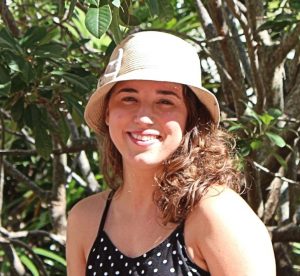 From the other side of a sidewalk café table in front of Starbucks on First Street, Katelyn Gravel smiles sheepishly from beneath a simple tan cloche hat. It’s a week day, so there’s lots of passing foot and vehicular traffic, but her eyes stay fixed on mine. She’s not easily distracted. That’s because Katelyn Gravel lives in the moment, whether she’s giving an interview or performing on stage.
From the other side of a sidewalk café table in front of Starbucks on First Street, Katelyn Gravel smiles sheepishly from beneath a simple tan cloche hat. It’s a week day, so there’s lots of passing foot and vehicular traffic, but her eyes stay fixed on mine. She’s not easily distracted. That’s because Katelyn Gravel lives in the moment, whether she’s giving an interview or performing on stage.
If you’re not familiar with Katelyn’s body of work, she is a co-founder of Ghostbird Theatre Company and regularly performs  in its productions. Her impressive resume includes Boxes Are for What We Keep (at the Happehatchee Center in Estero) Samuel Beckett’s Catastrophe and Barry Cavin’s Ibb (in the historic Langford-Kingston Home), ORBS! (at Koreshan State Park), Writing Shadows (also in the Langford-Kingston Home), No. 27 (performed at Bonita Springs’ historic Shangri-La Springs), The Chicken Play (also at the Happehatchee Center), Antigonick (performed in Marcus Jansen’s studio and gallery on Evans Road) and Mud.
in its productions. Her impressive resume includes Boxes Are for What We Keep (at the Happehatchee Center in Estero) Samuel Beckett’s Catastrophe and Barry Cavin’s Ibb (in the historic Langford-Kingston Home), ORBS! (at Koreshan State Park), Writing Shadows (also in the Langford-Kingston Home), No. 27 (performed at Bonita Springs’ historic Shangri-La Springs), The Chicken Play (also at the Happehatchee Center), Antigonick (performed in Marcus Jansen’s studio and gallery on Evans Road) and Mud.
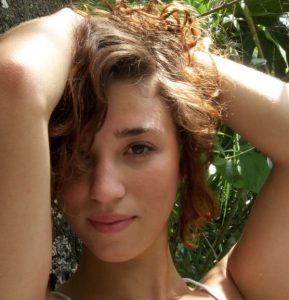 It was Mud that gave birth to Ghostbird in May of 2012.
It was Mud that gave birth to Ghostbird in May of 2012.
“Brittney Brady had to direct a play for her senior project,” Katelyn recounts. She and Brady are as close as sisters, their friendship dating back all the way to preschool. “She directed Mud at the Sidney & Berne Davis Art Center [a play written by Obie-award-winner Iren Maria Fornes and featuring Jim Brock, Armando Rivera and Katelyn, with original music by Phil Heubeck]. They really liked what we were doing and we had a really good turn-out, so they asked if we’d be interested in being 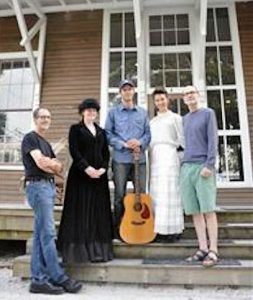 their resident theater company.”
their resident theater company.”
Just one tiny little glitch.
“We weren’t a theater company at that point,” Katelyn chuckles, marveling even now at the sheer serendipity of the offer.
“Brittney talked to Barry. Then we all talked about it.”
It didn’t take long for Brady, Brock, Cavin, Heubeck and Gravel to decide they could not pass up an opportunity like that.
 “It was pretty organic how it happened,” Katelyn nods, her eyes streaming merriment as though it were Christmas Day.
“It was pretty organic how it happened,” Katelyn nods, her eyes streaming merriment as though it were Christmas Day.
The neophyte company had a home. But now they needed a name.
“Phil [who’s married to Brady] and Jim Brock are avid birders,” Katelyn divulges. “They know their birds. One day 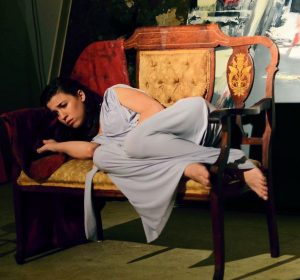 we were talking about names, and Phil proposed Ghostbird. None of us knew what that was.”
we were talking about names, and Phil proposed Ghostbird. None of us knew what that was.”
If you don’t know either, a ghost bird is a swamp-dwelling Ivory-billed woodpecker once thought to be extinct. But it’s been spotted sporadically over the past two decades, fueling speculation that the report of its demise has been, to paraphrase Mark Twain, premature. It’s last “official” sighting was in 2004, when an birdwatcher videotaped a white-winged bird outside the tiny Arkansas town 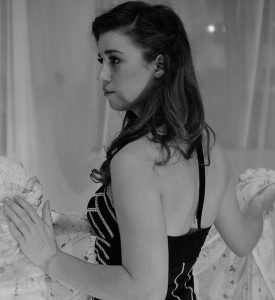 of Brinkley. So many birdwatchers descended on the town that filmmaker Scott Crocker decided to make a documentary. He titled it Ghost Bird. It was released in 2009.
of Brinkley. So many birdwatchers descended on the town that filmmaker Scott Crocker decided to make a documentary. He titled it Ghost Bird. It was released in 2009.
“Phil explained what the ghost bird meant to him,” Katelyn continues. “It’s swampy. It’s elusive. It’s off-beat and magical. We immediately agreed that’s what we’d call ourselves. It fit perfectly.”
And it gives the Company an unique brand.
Drawing 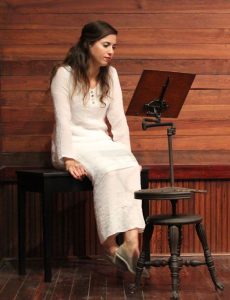 upon the elusory, evanescent and fleeting nature of its namesake, Ghostbird Theatre seeks to draw its audiences into those deep spiritual woods where they can discover loss, beauty, communion, reconciliation and hope. And although the Company performs plays written by other playwrights, most of its shows come from the deep and penetrating mind of Barry Cavin, an accomplished playwright with more than 40 fully-produced plays to his credit. He also just happens to be an esteemed Professor of Theatre at Florida Gulf Coast University.
upon the elusory, evanescent and fleeting nature of its namesake, Ghostbird Theatre seeks to draw its audiences into those deep spiritual woods where they can discover loss, beauty, communion, reconciliation and hope. And although the Company performs plays written by other playwrights, most of its shows come from the deep and penetrating mind of Barry Cavin, an accomplished playwright with more than 40 fully-produced plays to his credit. He also just happens to be an esteemed Professor of Theatre at Florida Gulf Coast University.
Which is where Gravel first encountered him.
Directing a play titled Apocalypse: The Living Blog.
Cavin’s the kind of playwright 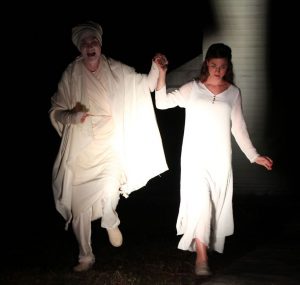 and director who’s playing three-dimensional chess while most others in theater are playing checkers or even Parcheesi. At the risk of gross understatement, listening to Cavin fir the very first time was a mind-blowing experience for the FGCU freshman.
and director who’s playing three-dimensional chess while most others in theater are playing checkers or even Parcheesi. At the risk of gross understatement, listening to Cavin fir the very first time was a mind-blowing experience for the FGCU freshman.
At Cypress Lake High, Gravel had done several musicals. You would think that they’d be the fulcrum of her theatrical aspirations given that her mother enrolled her in singing and dance lessons when she was just three or four years old.
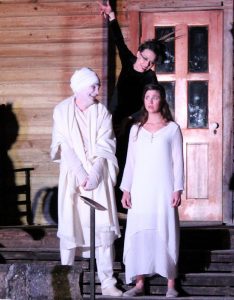 “I just don’t care for the genre,” she says flatly, giving a bare-shouldered shrug. “I didn’t like the type of singing and dancing you do in musical theater. It’s a little too ‘song and dancie.’ I’ve always been more drawn to the more off-beat stuff. Even as a kid, my favorite movie was the Rocky Horror Picture Show, which is not your average kid’s movie. It was weird, and I like weird. I’m drawn to a more avant garde style.”
“I just don’t care for the genre,” she says flatly, giving a bare-shouldered shrug. “I didn’t like the type of singing and dancing you do in musical theater. It’s a little too ‘song and dancie.’ I’ve always been more drawn to the more off-beat stuff. Even as a kid, my favorite movie was the Rocky Horror Picture Show, which is not your average kid’s movie. It was weird, and I like weird. I’m drawn to a more avant garde style.”
It’s not that Gravel fashions herself an intellectual. As a person, she’s open, genuine and completely unpretentious. She comes across as down-to-earth, more the girl next door than the debutante reclining in an uptown penthouse. Coming, as she does, 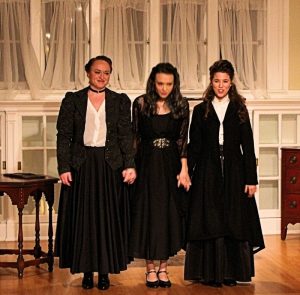 from that framework, she naturally gravitates to productions and parts that enable her to be authentic notwithstanding the artifice of the make-believe world that theater seeks to create.
from that framework, she naturally gravitates to productions and parts that enable her to be authentic notwithstanding the artifice of the make-believe world that theater seeks to create.
“I had been exposed to a small amount of avant garde theater at Cypress, but when I got to FGCU, having Barry as a professor was like hitting the jackpot. Wow! This whole world exists that I relate to and that I love! He exposed me to a whole new realm of theater that I didn’t previously know existed.”
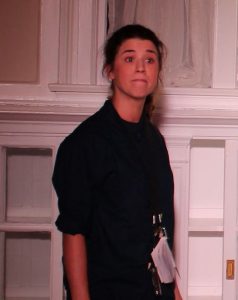 The types of roles that Gravel covets are those that push her to exceed and expand her limits, that challenge her to work on non-traditional elements. Where many, perhaps most actors relish the chance to be someone else somewhere else for the span of a month or more, Katelyn dreams of exploring the depths of intellect, emotion and the human condition.
The types of roles that Gravel covets are those that push her to exceed and expand her limits, that challenge her to work on non-traditional elements. Where many, perhaps most actors relish the chance to be someone else somewhere else for the span of a month or more, Katelyn dreams of exploring the depths of intellect, emotion and the human condition.
“It’s been awesome,” she rhapsodizes.
For those of us on the receiving end of her performances, as well.
But there’s more involved in playing roles crafted by Cavin than dissecting, 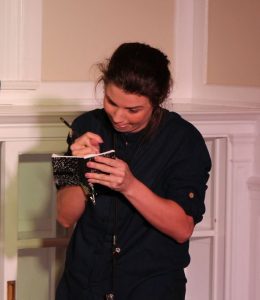 comprehending and projecting unfamiliar emotions – “like being assertive when you’re the type of person who’s pretty much always vulnerable,” she laughs self-consciously.
comprehending and projecting unfamiliar emotions – “like being assertive when you’re the type of person who’s pretty much always vulnerable,” she laughs self-consciously.
Because Cavin’s stories are typically nonlinear, there’s rarely a structured storyline like that found in most other plays. As a result, the dialogue and interactions between the characters are fractured and fragmented, without either a beginning or a logical end.
“We work moment to moment when we rehearse one of his plays,” Katelyn concedes.
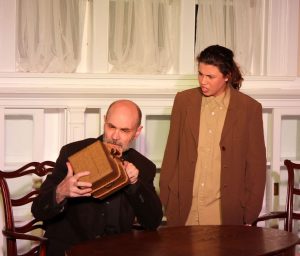 “Since there usually isn’t a linear storyline, you have to be really present in each moment. Just like in real life. We don’t have a linear storyline in our lives. You take each interaction as it is right in front of you, except [Barry] gives us tactics and motivation and the visceral feeling we’re supposed to have within each moment. So that’s how we piece it together, rather than in a big-picture type of way.”
“Since there usually isn’t a linear storyline, you have to be really present in each moment. Just like in real life. We don’t have a linear storyline in our lives. You take each interaction as it is right in front of you, except [Barry] gives us tactics and motivation and the visceral feeling we’re supposed to have within each moment. So that’s how we piece it together, rather than in a big-picture type of way.”
There’s actually 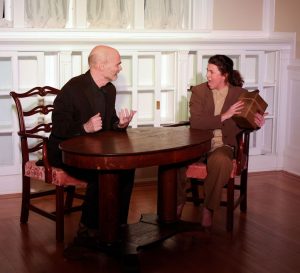 another wrinkle where Ghostbird productions are concerned. They don’t generally take place inside the confines of an actual theater. There’s rarely a stage, never mind a proscenium. They take place outdoors along the footpaths bisecting locations like the Happehatchee Center in Estero, Koreshan State Park and Shangri-La Springs in Bonita or inside places like the historic Langford-Kingston Home and Marcus Jansen’s old converted-warehouse-of-a-gallery on the eastern edge of the Fort Myers River District.
another wrinkle where Ghostbird productions are concerned. They don’t generally take place inside the confines of an actual theater. There’s rarely a stage, never mind a proscenium. They take place outdoors along the footpaths bisecting locations like the Happehatchee Center in Estero, Koreshan State Park and Shangri-La Springs in Bonita or inside places like the historic Langford-Kingston Home and Marcus Jansen’s old converted-warehouse-of-a-gallery on the eastern edge of the Fort Myers River District.
“With any 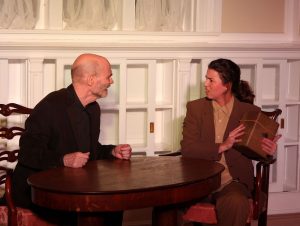 site-specific work, you cannot control light or sound,” Katelyn amplifies. “So you really have to be creative with how you use the space. Sound is super-important. In the open-air pavilion at the Happahatchee Center, there are no walls to reflect back our voices. So we really had to project. And then there are competing external sounds. During dress rehearsal, for example, it rained and every word we said was just sucked up by rain. We couldn’t even hear each other.”
site-specific work, you cannot control light or sound,” Katelyn amplifies. “So you really have to be creative with how you use the space. Sound is super-important. In the open-air pavilion at the Happahatchee Center, there are no walls to reflect back our voices. So we really had to project. And then there are competing external sounds. During dress rehearsal, for example, it rained and every word we said was just sucked up by rain. We couldn’t even hear each other.”
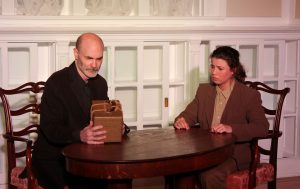 But Gravel and the other members of the theater company wouldn’t have it any other way. Katelyn especially loves the unique and divergent ways the actors and the audience interact with the space and each other. And then there’s the element of surprise. Since the company is only permitted a rehearsal or two at the venue, the blocking [how they move about
But Gravel and the other members of the theater company wouldn’t have it any other way. Katelyn especially loves the unique and divergent ways the actors and the audience interact with the space and each other. And then there’s the element of surprise. Since the company is only permitted a rehearsal or two at the venue, the blocking [how they move about 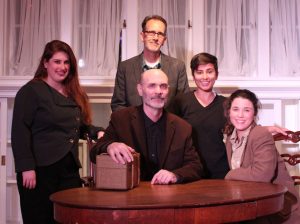 the performance area] and environmental factors are tenuous, at best.
the performance area] and environmental factors are tenuous, at best.
“But it also engenders more spontaneity,” observes Katelyn, adding her own typically positive spin.
Ghostbird is the only theater company in the American South devoted to site-specific work. Ever striving to partner with just the right venue for each of its productions, Ghostbird has been recognized as one of the 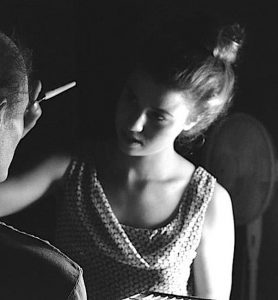 ten best companies in Florida for live theater.
ten best companies in Florida for live theater.
One site that Ghostbird hasn’t performed in, but would love to, is the Hall of 50 States. But that may never materialize due to fire safety and other Code considerations. But in January, the company will be performing in a brand new venue, the recently-renovated Collaboratory on Jackson Street across from the bus station that was previously a train depot and home to the Southwest Florida Museum of History.
It’s conceivable 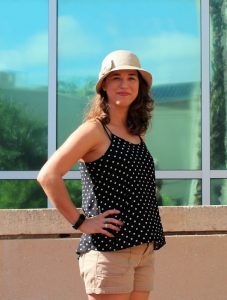 you’ll see Katelyn on the playwriting side of the equation as well. She previously collaborated on No. 27, on which, she emphatically clarifies, Barry did most of the writing with Katelyn serving in the capacity of a “contributor” in chief. But she does have a few plays under development, although she characterizes them as consisting presently of a series of unconnected scenes.
you’ll see Katelyn on the playwriting side of the equation as well. She previously collaborated on No. 27, on which, she emphatically clarifies, Barry did most of the writing with Katelyn serving in the capacity of a “contributor” in chief. But she does have a few plays under development, although she characterizes them as consisting presently of a series of unconnected scenes.
“What I’d actually like to do is write an off-beat children’s show, performed by children for children, as well as adults,” Katelyn proclaims. “There’s nothing like that around here.”
Gravel is ascendant. 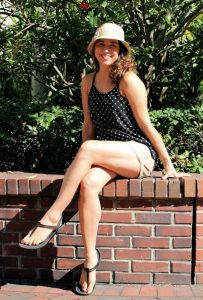 She’s barely scratched the surface of the actor, playwright, poet and songwriter that she can and will be. If you haven’t seen her perform yet, make sure you do. She’ll be performing in Ghostbird’s production of Jim Brock’s Everyone on this Train at the restored ACL Railway Depot on January 18 & 19 and 25 & 26, 2019. Space is limited, so reserve your seats early.
She’s barely scratched the surface of the actor, playwright, poet and songwriter that she can and will be. If you haven’t seen her perform yet, make sure you do. She’ll be performing in Ghostbird’s production of Jim Brock’s Everyone on this Train at the restored ACL Railway Depot on January 18 & 19 and 25 & 26, 2019. Space is limited, so reserve your seats early.
November 30, 2018.














 Tom Hall is both an amateur artist and aspiring novelist who writes art quest thrillers. He is in the final stages of completing his debut novel titled "Art Detective," a story that fictionalizes the discovery of the fabled billion-dollar Impressionist collection of Parisian art dealer Josse Bernheim-Jeune, thought by many to have perished during World War II when the collection's hiding place, Castle de Rastignac in southern France, was destroyed by the Wehrmacht in reprisal for attacks made by members of the Resistance operating in the area. A former tax attorney, Tom holds a bachelor's degree as well as both a juris doctorate and masters of laws in taxation from the University of Florida. Tom lives in Estero, Florida with his fiancee, Connie, and their four cats.
Tom Hall is both an amateur artist and aspiring novelist who writes art quest thrillers. He is in the final stages of completing his debut novel titled "Art Detective," a story that fictionalizes the discovery of the fabled billion-dollar Impressionist collection of Parisian art dealer Josse Bernheim-Jeune, thought by many to have perished during World War II when the collection's hiding place, Castle de Rastignac in southern France, was destroyed by the Wehrmacht in reprisal for attacks made by members of the Resistance operating in the area. A former tax attorney, Tom holds a bachelor's degree as well as both a juris doctorate and masters of laws in taxation from the University of Florida. Tom lives in Estero, Florida with his fiancee, Connie, and their four cats.